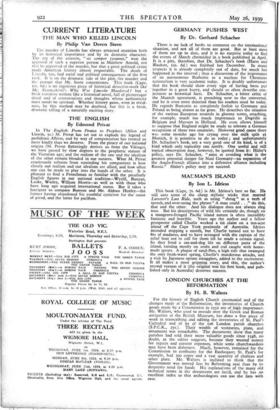There is no lack of books to comment on the
international situation, and not all of them are good. But at least most of them are up to date, and it is no surprise today to find the events of March chronicled in a book published in April. It is a pity, therefore, that Dr. Schacher's book (Hurst and Blackett, ros. 6d.) was finished last December. In many respects it is already completely out of date, for much has happened in the interval ; thus a discussion of the importance of an autonomous Ruthenia as a nucleus for Ukrainian nationalism is very academic today. It is doubly unfortunate that the book should show every sign of having been put ' together in a great hurry, and should so often describe con- jectures as historical facts. Dr. Schacher, a bitter critic of the Munich agreement, is preaching now to the converted, and he is even more dejected than his readers need be today. He regards Rumania as completely forfeit to Germany and Poland as being almost as far gone. He describes the situation of the various European neutrals in gloomy terms, attaching, for example, much too much importance to Degville in Belgium and Mucsert in Holland. He even allows himself to suppose that England might be ready to tolerate a German occupation of these two countries. However good cause there wa; some months ago for crying over the milk spilt at Munich, it is pointless to do so today ; and unfortunately Dr. Schacher's book, not a very good one of its kind, is of a kind which only topicality can justify. One useful and still topical observation may, however, be quoted from it: Hitler's policy, says Dr. Schacher, "aims at avoiding what is the greatest potential danger for Nazi Germany—an expansion of the Anglo-French alliance into a defensive alliance including Russia." Hitler's policy may yet succeed.


























































 Previous page
Previous page